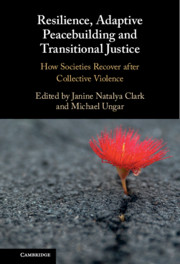Acknowledgements
The idea for this book developed out of a five-year (2017–2022) research project, funded by the European Research Council under grant number 724518 and led by Janine Natalya Clark, about resilience and victims/survivors of conflict-related sexual violence. As the research project progressed, so too did an intellectual curiosity about the possibility of developing an edited volume that would widen the focus beyond conflict-related sexual violence and bring together eminent scholars from diverse disciplines to explore the concept of resilience in the context of societies that have experienced mass violence and human rights abuses. Michael Ungar, as a member of the project’s International Advisory Board and a global authority on resilience, was a natural choice as co-editor.
We thank all of the book’s contributors – a mixture of academics and practitioners – for their work and commitment to keeping the book on schedule in the very difficult and challenging circumstances of a global pandemic. We also sincerely thank our editors at Cambridge University Press, Finola O’Sullivan and Marianne Nield, for all their support. Thank you also to two anonymous reviewers for their very helpful comments on the book proposal. Finally, we are very grateful to Igor Pekelny, a research associate at the Resilience Research Centre – part of Dalhousie University in Canada – for his work in formatting the chapters.



